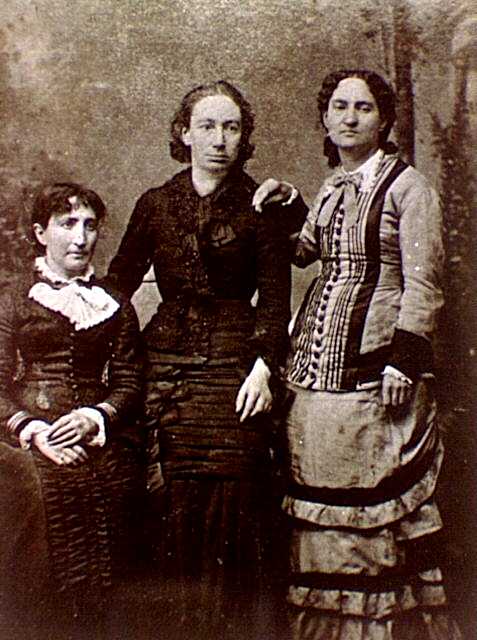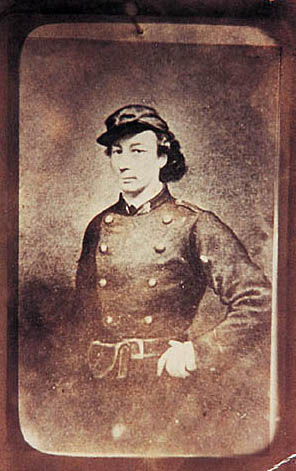The Trial of Louise Michel
From Louise Michels, My Trials (http://communeeditions.com/2013/10/08/my-trials-by-louise-michel/)
The court clerk, M. Duplan, reads the following report:
It is in 1870, on the occasion of the death of Victor Noir, that Louise Michel began to express her revolutionary ideas.
An unknown school teacher with few students, it was not possible for us to know what her connections were and what part she played in the precursory events of the
Louise Michel in Uniform |
monstrous assault that terrified our unfortunate country.
It is unnecessary, certainly, to retrace in their entirety the incidents of March 18, and as point of departure of the accusation, we will limit ourselves to clarifying the part taken by Louise Michel in the bloody tragedy of which the Buttes-Montmartre and the rue des Rosiers were the theater. The accomplice in the arrest of the unfortunate generals Lecomte and Clement Thomas was afraid of seeing the two victims escape. “Don’t let them go!” she cried with all her might to the wretches who surrounded them.
And later, when the murder had been carried out, in the presence, so to speak, of the mutilated corpses, she showed her complete joy at the spilled blood and dared to proclaim, “It serves them right.” Then, beaming and satisfied with the good day, she goes to Belleville and to the Villette, to make sure “that the neighborhood remained armed.”
She returns home the 19th, after having taken the precaution of shedding the federate uniform that could compromise her. But she feels the need to chat a bit about the events with her doorman.“Ah!” she cries, “if Clemenceau had gotten to rue des Rosiers a few moments earlier, they wouldn’t have shot the generals, because he was against it, being on the side of the Versaillais.”
At last, “the hour of the coming of the people has sounded.” Paris, in
the power of the foreigner and the scoundrels rushing in from all corners of the world, declares the Commune.
As secretary of the society known for the “Improvement of Working Women through Work,” Louise Michel organizes the famous Central Committee of the Union of Women, as well as the vigilance committees responsible for recruiting paramedics and, at the final moment, working women for the barricades, perhaps even arsonists. . .
Including the jobs mentioned previously, Louise Michel directed a school at 24, rue Oudot. There, from her lectern, she professed, in her rare leisure time, the doctrines of free-thinking and sang to her young students the poetry fallen from her pen, among others the song entitled“The Avengers.”
President of the Revolutionary Club, held at the church of Saint-
Bernard, Louise Michel is responsible for the vote delivered during the session of May 18 (21 Floreal year LXXIX), and having for objective:
“The abolition of the magistrature, the obliteration of the Legal Codes, their replacement by a committee of justice;
“The abolition of religions, the immediate arrest of priests, the sale of their goods and that of the deserters and traitors who supported the wretches of Versailles;
“The execution of one important hostage every twenty-four hours until
the release and arrival in Paris of Citizen Blanqui, appointed member of
the Commune.”
 It wasn’t enough, however, for this “ardent soul,” as the author of an imaginative account that figures in the dossier likes to characterize her, to rouse the populace, applaud murder, corrupt children, preach fratricidal struggle, in a word to encourage all crimes; it was still necessary to lead by example and put herself on the line!
It wasn’t enough, however, for this “ardent soul,” as the author of an imaginative account that figures in the dossier likes to characterize her, to rouse the populace, applaud murder, corrupt children, preach fratricidal struggle, in a word to encourage all crimes; it was still necessary to lead by example and put herself on the line!
We also find her at Issy, at Clamart, and Montmartre, fighting at the front lines, firing gunshots or rallying the deserters.
Le Cri du peuple [The Cry of the People, a newspaper put out by the Commune.]
affirms as much in its April 14 edition:
“Citizen Louise Michel, who fought valiantly at Moulineaux, was injured at the fort of Issy.” . . .
What is the motive that pushed Louise Michel onto the fatal road of politics and revolution?
It is clearly vanity.
Illegitimate daughter raised by charity, instead of thanking Providence for having given her a superior education and the means to live happily with her mother, she indulges her fanatical imagination, her short-
tempered nature and, after having broken with her benefactors, she rushes off for adventure in Paris.
The wind of Revolution begins to blow: Victor Noir has just died.
It’s the moment to enter onto the scene. But Louise Michel is loath to play the role of cohort; her name must grab the public’s attention and appear on the first line of misleading proclamations and posters.
Nothing remains for us but to give legal classification to the acts committed by this maniac since the beginning of the hellish crisis that France has just gone through until the end of the ungodly combat in which she took part among the tombs of the Montmartre cemetery.
She knowingly aided the culprits who arrested generals Lecomte and Clement Thomas in the acts perpetrated, and this arrest was followed by the bodily torture and death of these two unfortunate men.
Intimately linked with the members of the Commune, she knew all their plans in advance. She aided them with all her strength and with all her will. What is more, she aided them and often went beyond them. She offered to go to Versailles and assassinate the President of the Republic, in order to terrify the Assembly and, according to her, bring an end to the struggle.
She is as guilty as “Ferré the proud Republican,” whom she defends in such a bizarre manner, and whose head, to use her expression, “is a challenge thrown to your consciences and the answer a revolution.”
She excited the passions of the masses, preached war without mercy or rest and, a she-wolf hungry for blood, caused the deaths of the hostages through her diabolical plots.
